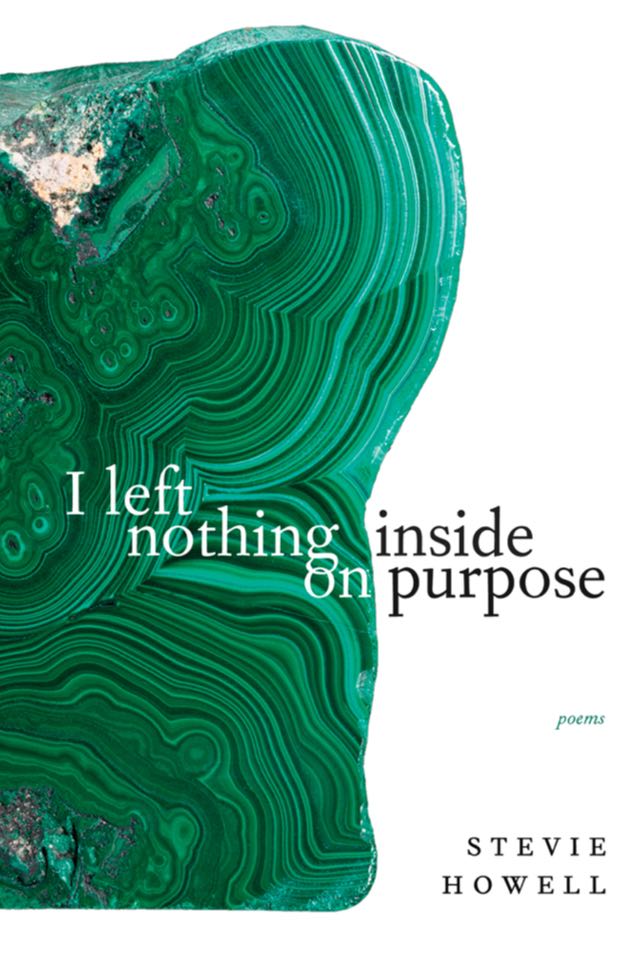I left nothing inside on purpose
— Terry Abrahams
Stevie Howell’s latest collection is as evocative as it is disruptive - in the dearest sense of the term. The cover, featuring the image of a beautiful slab of malachite, caught my eye long before the book found its way into my hands. Coincidentally, the day I bought it, I stopped in a mineral and fossil store on the way home and found myself, as usual, stilled into silence by the rows and rows of stones. Beyond beauty was the inherent curiosity they evoked in me—where did they come from, who gathered them, what do they do, what do they mean—overwhelming, obviously, and this happens every time I stop by.

Of course, the malachite matching the cover caught my eye, and I ended up catching the eye of an employee, who, so delighted he was to see malachite reflected back at him on the page, took a picture of the book, and asked about it as someone who seemingly hadn’t read much poetry before.
Howell’s book is like this moment I shared with a stranger: arresting, thoughtful, easy to share, difficult to discuss, and absurdly, wonderfully human. The poems within take emotional and physical journeys, from the heart to Toronto to the wings of a cormorant to Kona, Hawaii, always, it seems, asking, as one does in ‘Inflorescence’: “Everyone, pls tell me yr life story -”
To which I say—gladly. Everywhere we are, we are with Howell and, by extension, the narrator of these poems. I am hesitant to really call them journeys, though—something about these poems is much closer to home. Profoundly personal at times, playing with memory, our perception of people, and a strange and perhaps almost morbid interest in social media, Howell, with seemingly effortless and simple observations, has readers stop entirely in their tracks.
So, no. No travelling. Or, if you are swept away, you don’t go very far. Someone or something pulls you back in. You are right here, reading, in the swill and swell of poetry that slides easy over itself with a rhythm I immensely enjoyed. This is the kind of book that aids in understanding how others think, feel, live. It’s as comforting as it is startling, and Howell’s emotive honesty is apparent in how many of these poems read as if written quickly, jotted down in an app or on a napkin, that tip-of-the-tongue, here-and-now tenderness that can lead to a smile, a sigh, a silent nod.
Though not a complete narrative, these poems do flow into each other. ‘Hollow all the way down’ ends with “But you / can’t know anything in yr heart” before leading the eye to ‘In the heart,’ a poem consisting entirely of the phrase “of the heart.” However, it ends with “…of the heart of another man. Land, I mean. Land.” Likewise, my favourite poem, ‘Birding in Wolfville,’ closes with a sentiment I’ve struggled with, shared: “I always want / the prey to escape. / Which is also harsh.” Next up: ‘Never saw a wild thing feel sorry for itself.’ It’s the little details like this that draw a collection as thematically disparate as this together, and I’m ever so happy to delight in it.
Overall, nothing, it seems, is unworthy enough to be left unexamined in these poems. Not even the physical book or its reader, to which Howell makes reference to in the acknowledgements: “& thank you, reader, for holding me in yr hands rn” is how it all ends. Now, the book closed, set down, even set aside, my eyes are still drawn to the brightness of the cover, stark green against a starker white, emanating energy of thought, of feeling, smooth and easy as holding malachite. Like my own little stone, I don’t think I can properly shelve it.